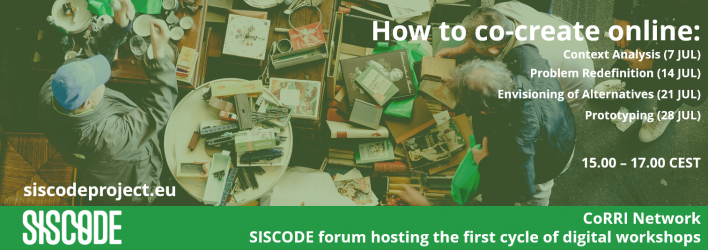Like most other organisations, SISCODE's ten co-creation journeys experienced the challenge to move their activities online due to COVID-19 outbreak.
Through these experiences, team members have learned how significant it is to create conditions for safe and open online collaboration among different stakeholders gathered around the common challenge. To share our learning outputs, the SISCODE project used the CoRRI Network as a dissemination forum whose mission is to serve as an interface to transform and re-orient RRI towards a practice-based and inclusive approach.
In this cycle devoted to online co-creation, the team (composed of SPI and POLIMI) prepared and hosted in July four workshops whose topics correspond to four stages in the SISCODE co-creation journey:
The goal was to provide the participants an opportunity to discuss the implications of shifting co-creation activities from on-site to online, and hence experience some methods, practice, and tools for engaging users online. The main focus of this workshop was to define and illustrate through hands-on practice the first stage of the co-creation journey: Context Analysis and Stakeholder engagement conducted online.
The workshop focused on the second stage of the SISCODE co-creation journey: Problem Reframing. The workshop narrowed down its focus on the workability and application of the tool Idea Card.
The main topic of the workshop was about the third stage of the co-creation journey: Envisioning Alternatives. The goal of this stage was to allow participants to use the preselected key challenges, of which 3 were reframed in the second stage, and to formulate ideas for a solution by using an appropriated version of the SISCODE synthesis tool.
The focus of this workshop was to experience the use of prototyping tools such as the SISCODE Synthesis Tools - Stakeholder Persona and Stakeholder Journey online. It is of great significance to understand the relationship between the idea solution and its target audience (i.e. end-user and other relevant stakeholders) during the prototyping stage.

